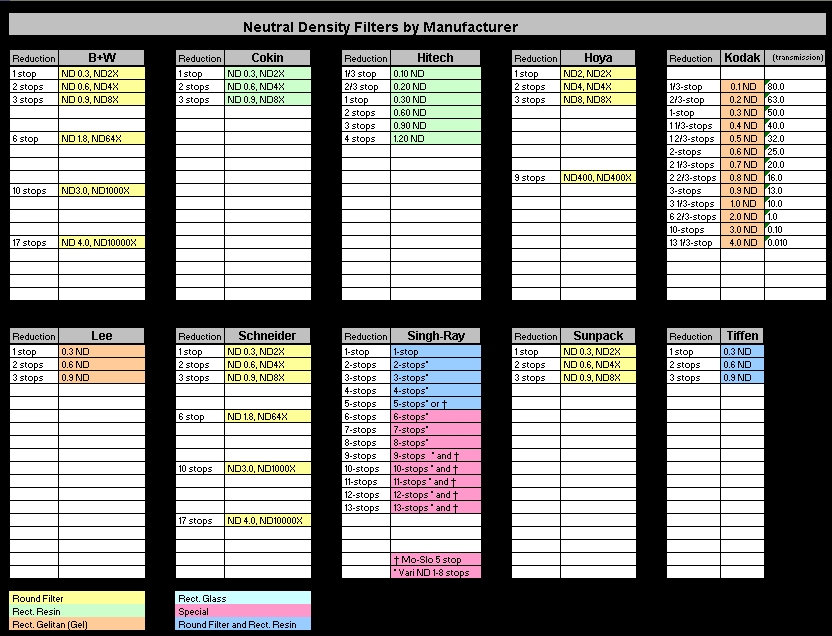ThomasHAdams
ShutterBug


Joined: Feb 20, 2005
Posts: 102
Location: Oregon, USA

|
 Posted:
Mon Oct 08, 2007 8:28 am Posted:
Mon Oct 08, 2007 8:28 am |

|
There are several different types of ND and ND Grads. I believe a good way to start out is to differentiate between the various styles of ND and ND grads.
For our purposes here we will have 3 different types, round, square, and rectangular. There are neutral density (ND) filters and neutral density graduated (ND Grad) filters which provide options to people that use filters to modify exposure (or add an effect) for a scene or portions of it.
A round ND filter is used just like other filters on a camera lens. It screws into the lens threads and therefore limited inherently by the fact that it can only rotate about an axis concentric to the lens axis. They require less setup time, and like other filters can be used with a step down adapter.
A square ND filter is similar to the round ND filter as described above, but does not have threads, so would not screw into a lens.
A round or square ND filter would not need to be moved, as it is designed to cover the entire frame, and decrease the amount of light gathered from the entire scene. You will find the benefits of the square and or rectangular filters are the fact that they can be fitted to a large assortment of lenses. They do not have a metal ring that is threaded to a specific diameter, but the holders for these often utilize some sort of an adapter with a filter holder, to mount to the lens.
An ND grad filter is unique in that the effect transitions to clear across the length of the filter. The type of transition is often referred to as hard or soft, this describes the distance or abruptness of the effect transition. The Hard is an abrupt transition from dark to clear, where as the Soft is a much more gradual transition. For example, a Hard ND Grad could be used for the horizon at the beach, while a Soft ND Grad could be used for a partially lit tree line.
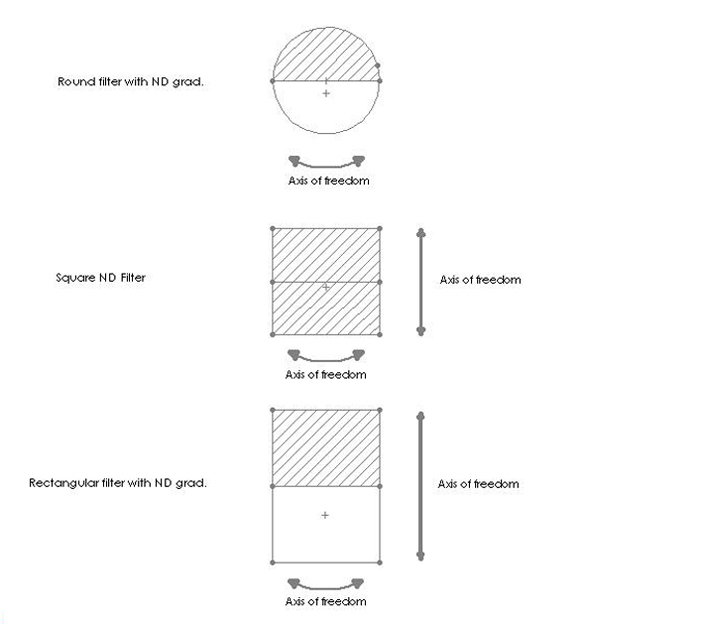
Drawing 1: Freedom of movement for each filter type
Now with that in mind, it is of course possible to buy a round filter equal to the largest lens diameter in your collection, and then purchase step up rings to suit the requirements of your smaller lenses. This can be costly depending on your collection of lenses, what equipment you already have etc. There is no benefit in the square or rectangular filters in this department as many holders, i.e. Cokin for example, require an adapter ring to fit the lens diameter, you can also use step up rings for these. In my opinion, I do not believe that one style out weighs the other in this area. It will cost you some money, period.
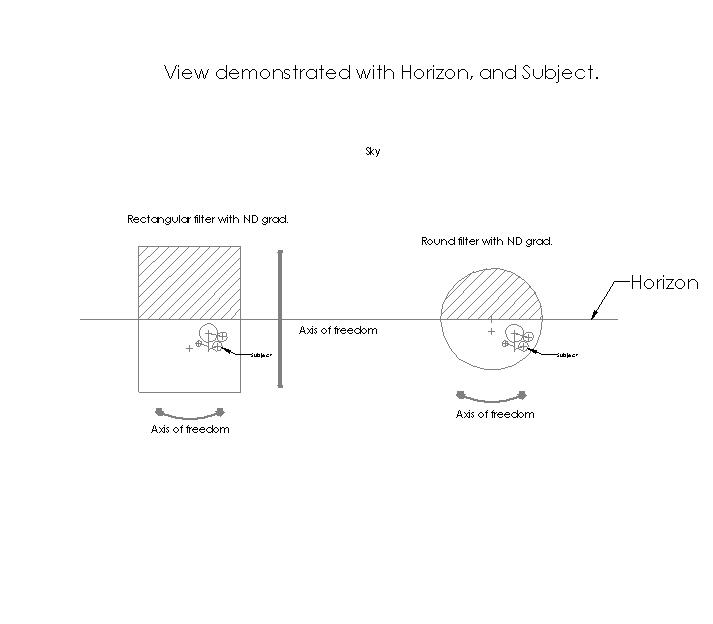
Drawing 2: Filter on horizon example
With ND Grads and “other” filters where the effect is not committed to the entire filter, I believe the winner is clearly the rectangular filters generally speaking. Imagine 2 ND Grad filters, one round that is only able to spin on its axis, or, around in a circle. The second ND Grad is in a holder, which can spin in a circle, just like the round filter. The advantage is that it can be adjusted up and down (parallel with the focal plane) as well.
If the round ND Grad filter is being used for the horizon, the only place you can place the focal center of the round filter style is, where? Yep, the center of the horizon, you can rotate the camera 90° and re-align the filter to the horizon for alternate framing. The point here is that you lack freedom, this makes composition difficult not impossible, just difficult. Remember the rule of thirds?
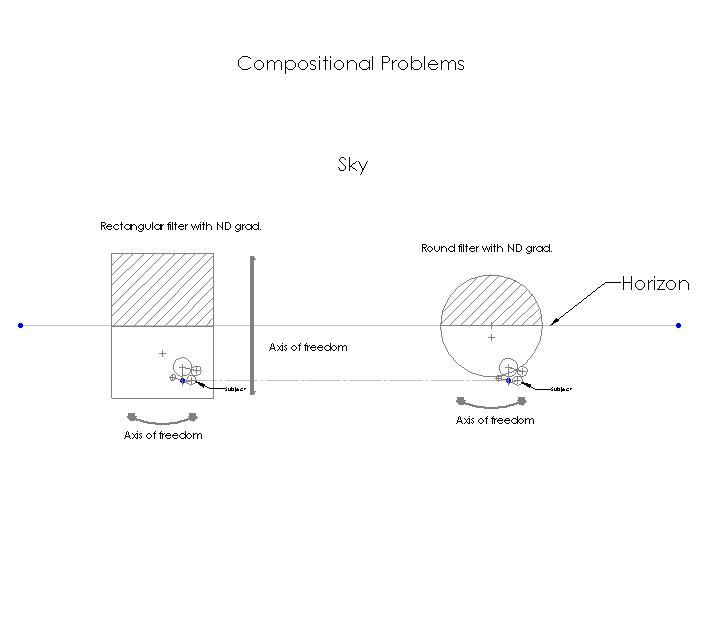
Drawing 3: Compositional problems
With a rectangular ND Grad filter, you can slide the filter up and down so that the center of graduation is aligned with the horizon, and you are able to position your frame around a subject while following the rule of thirds. (Just an example of course, but you get the picture :P) And of course you can also rotate the camera to 90° and rotate the filter holder for alternate framing.
Here is an example scenario utilizing the stacking of rectangular filters/round filters, I choose to use a 2 stop ND filter, and a 1 stop ND grad. With the round filters, please see above for the limitations on the ability to move the ND grad. For the rectangular, please also see above. Again you will find the same limitations of the round and the same freedom of movement with the rectangular, now we can visualize what that means when actually making photographs’. Trying to use the round ND grad in this fashion would prove difficult at best.
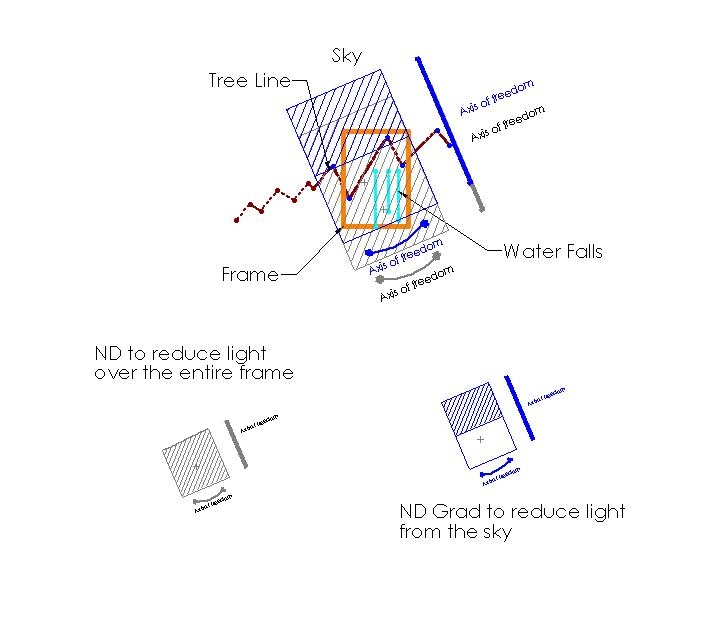
Drawing 4: Real world scenario, an example
On a final note, the quality of the filter is often reflected in the cost. Much like going automotive tire shopping. You can buy 2 tires, one is $50.00 and the other is $150.00, why? They are obviously not the exact same, that extra $100.00 is not generosity. It could be for an improved build quality, or a longer warranty, etc. The main thing to remember is that most of the time, you get what you pay for.
While Cokin filters themselves are fairly inexpensive compared to Lee and to Singh-Ray (sp) if you perform a web search, you will find that the Cokin filters seem to have a slight color shift. Lee is often regarded as an excellent filter as well as Sing-Ray, neither of which have a color shift (they are a true neutral grey). Inspect the Cokins prior to purchase if you can do so. Do not purchase any of the Cokin CP's, Close up filters, Star filters (the round ones) etc. in the P or A series sizes. They simply are of poor quality. I do not have any experience with the X-Pro or Z-Pro series round filters because I learned my lesson.
There are many manufacturers of square and rectangular filters. There is an incomplete list below, I have experience with Cokin and Lee filters only. They typically come in either glass, or resin (polycarbonate).
Cokin
Lee
Tiffen
HiTech
Singh-Ray |
Last edited by ThomasHAdams on Thu Aug 26, 2010 12:08 pm; edited 2 times in total |
|
ThomasHAdams
ShutterBug


Joined: Feb 20, 2005
Posts: 102
Location: Oregon, USA

|
 Posted:
Thu Jul 22, 2010 11:20 am Posted:
Thu Jul 22, 2010 11:20 am |

|
To add:
Heliopan Round Filters
Density Light Loss Filter Factor Exposure Correction
ND 0,3 50,00 % 2x -1
ND 0,6 25,00 % 4x -2
ND 0,9 12,50 % 8x -3
ND 1,2 6,25% 16x -4
ND 2,0 1,00% 100x -6,66
ND 3,0 0,10% 1000x -10
ND 4,0 0,012% 10000x -13 |
| |
|
ThomasHAdams
ShutterBug


Joined: Feb 20, 2005
Posts: 102
Location: Oregon, USA

|
 Posted:
Mon Aug 23, 2010 3:14 pm Posted:
Mon Aug 23, 2010 3:14 pm |

|
To Add/Update:
LEE Filters 4 x 4" Big Stopper Filter 10 Stop (ND?) Long Exposure Filters (Glass)
Hitech 10 stop ND (resin)
B+W 3.0 10 stop ND (Round) Glass
B + W Neutral Density Factors
| Quote: | • ND.3 (exposure adjustment = 1 stop, reduces ISO 1/2)
• ND.6 (exposure adjustment = 2 stops, reduces ISO 1/4)
• ND.9 (exposure adjustment = 3 stops, reduces ISO 1/
• ND 1.2 (exposure adjustment = 4 stops, reduces ISO 1/16)
• ND 1.8 (exposure adjustment = approx. 6 stops, transmits 1% of light,)
• ND 3.0 (exposure adjustment = 10 stops, transmits 0.1% of light)
• ND 4.0 (exposure adjustment = 13-2/3 stops, transmits 0.01% of light)
• ND 6.0 = (exposure adjustment = approx. 20 stops) |
|
| |
|










